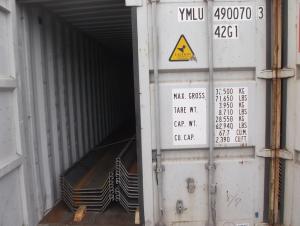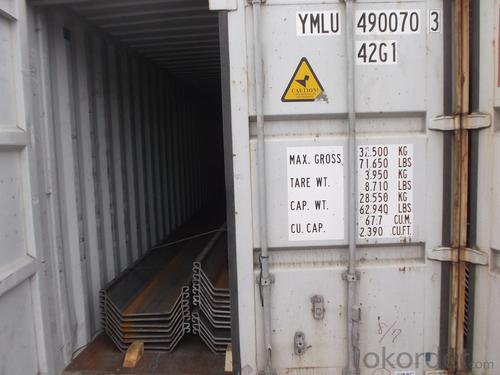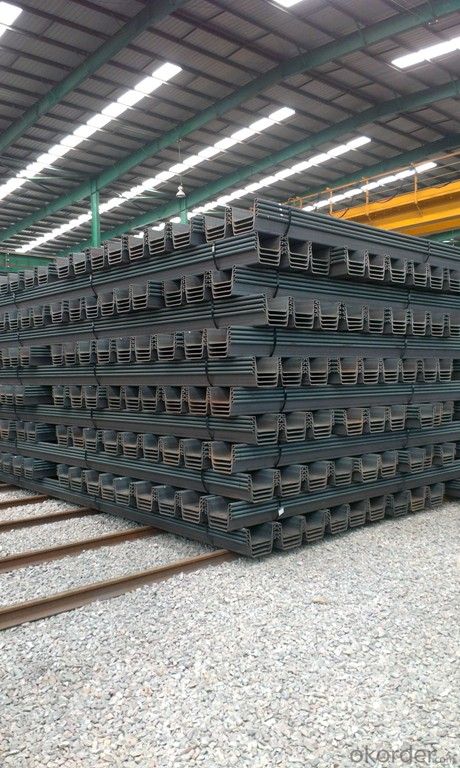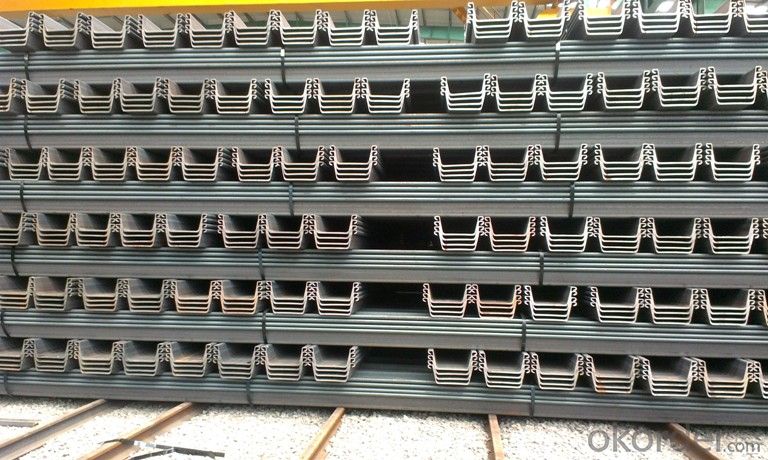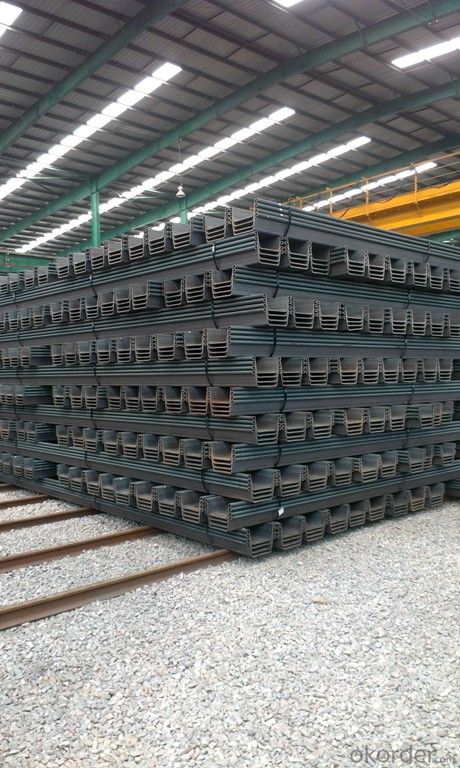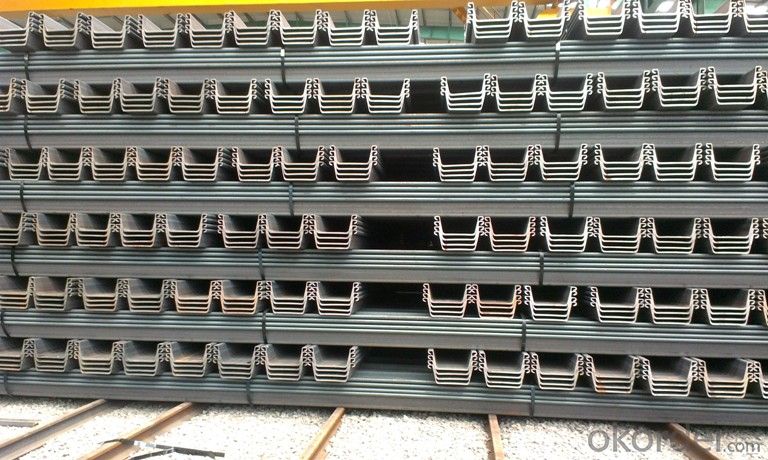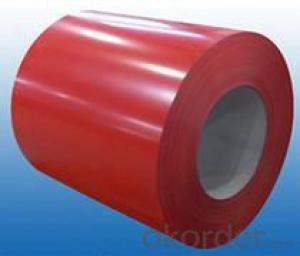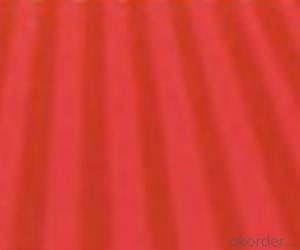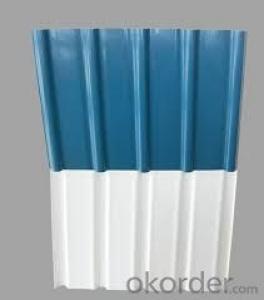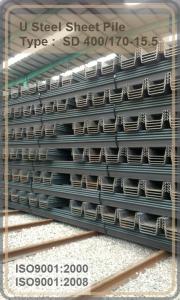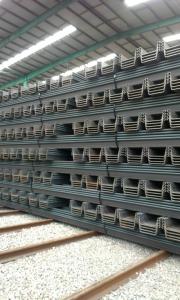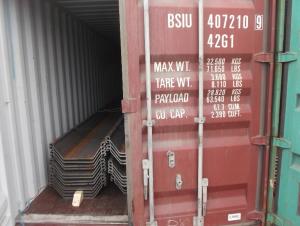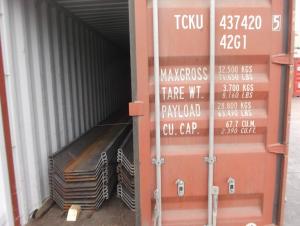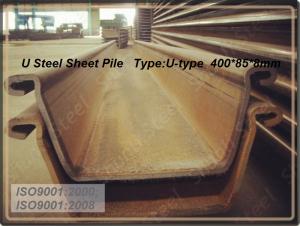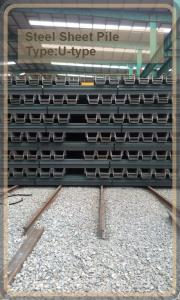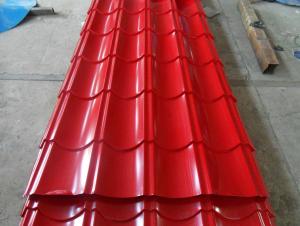U Steel Sheet Pile/ 400*100*8-10.5mm/ Export Steel Sheet Pile as Your Request
- Loading Port:
- China Main Port
- Payment Terms:
- TT or LC
- Min Order Qty:
- 200 Piece/Pieces m.t.
- Supply Capability:
- 10000 m.t./month
OKorder Service Pledge
OKorder Financial Service
You Might Also Like
Quick Details Steel Sheet Pile
Place of Origin: China (Mainland)
Model Number:SD400
Material: Steel
Product name: Steel Sheet Pile
Steel sheet pile type: U-type
Steel sheet pile material: SY295
Steel sheet pile width: 400mm
Steel sheet pile height: 100mm
Steel sheet pile thickness: 10.5mm
Steel sheet pile length: 6m or 12m
Steel sheet pile loading: container , 20 ft or 40GP
Steel sheet pile used: temporary earth-retaining,temporary cofferdam works
Steel sheet pile weight: 60kgs / m
Packaging & Delivery
| Packaging Details: | packaging :by bulk . loading : container 20ft or 40GP |
|---|---|
| Delivery Detail: | stock ( more type has stock ) |
Specifications
Steel Sheet Pile 400*100*10.5mm
U Steel Sheet Pile
temporary earth-retaining/temporary cofferdam works/permanent structures
Export U Steel Sheet Pile 400*100*10.5mm
Product Description
Steel Sheet Pile Usage
emporary earth-retaining, temporary cofferdam works and permanent structures
Steel Sheet Pile Type :
Type | Size | Per piece | Per Meter of pile wall | ||||||||
Width | Height | Thickness | weight | section area | section moment | section modulus | section area | section moment | section modulus | weight | |
mm | mm | mm | kgs /m | cm2 | cm4 | cm3 | cm²/m | cm4/m | Cm³/m | kg/m² | |
SD400/85-8 | 400 | 85 | 8 | 35.5 | 45.21 | 598 | 88 | 113 | 4500 | 529 | 88.80 |
SD400/100-10.5 | 400 | 100 | 10.5 | 48 | 61.18 | 1240 | 152 | 153 | 8740 | 874 | 120.10 |
SD400/125-13 | 400 | 125 | 13 | 60 | 76.42 | 2220 | 223 | 191 | 16800 | 1340 | 149.90 |
SD400/150-13.1 | 400 | 150 | 13.1 | 58.4 | 74.4 | 2790 | 250 | 186 | 22800 | 1520 | 146.00 |
SD400/170-15.5 | 400 | 170 | 15.5 | 76.1 | 96.99 | 4670 | 362 | 242.5 | 38600 | 2270 | 190.40 |
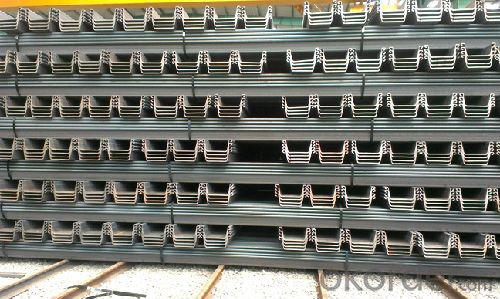
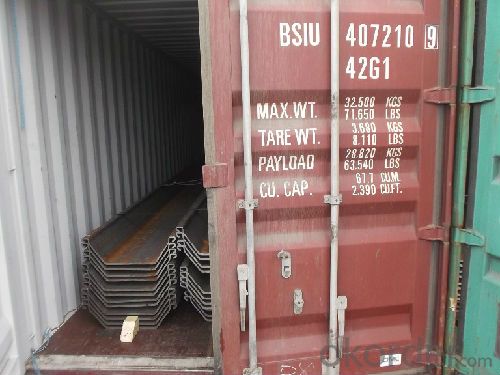
Packaging & Shipping
Packing : it use container to load , 6M use 20ft container ; 12M use 40GP container .
Our Services for Steel Sheet Pile
World leading manufacturer of cold-formed Sheet Pile.
Factory got a variety of quality certification : ISO9001:2000; ISO9001:2008.
Our products popular applicated for temporary earth-retaining, temporary cofferdam works and permanent structures
- Q: Can the steel sheets be easily formed into cylinders or tubes?
- Yes, steel sheets can be easily formed into cylinders or tubes using various metalworking techniques such as rolling, welding, and bending.
- Q: Can the steel sheets be used for insulation purposes?
- No, steel sheets are not typically used for insulation purposes as they conduct heat and cold rather than providing insulation.
- Q: Can steel sheets be used for cladding or facades?
- Yes, steel sheets can certainly be used for cladding or facades. Steel is a durable and versatile material that provides strength and protection against external elements. It is often chosen for its aesthetic appeal and can be used in various architectural designs, providing a modern and sleek look to buildings.
- Q: What is the difference between a perforated and non-perforated steel sheet?
- The designs and functionalities of perforated and non-perforated steel sheets distinguish them from each other. Perforated steel sheets are characterized by evenly distributed small holes or perforations on their surfaces, which can vary in shape and size depending on specific application requirements. The main purpose of a perforated steel sheet is to enable the flow of air, light, sound, and liquids through the sheet while maintaining its structural integrity. This makes it highly suitable for applications where ventilation, filtration, or visibility is crucial. Industries such as architecture, automotive, manufacturing, and construction commonly utilize perforated steel sheets for purposes like acoustic panels, protective barriers, decorative elements, and filter screens. On the contrary, non-perforated steel sheets lack any holes or perforations on their surfaces. They are solid sheets of steel primarily used for applications where strength, durability, and resistance to impact or abrasion are significant factors. Structural engineering, machinery, shipbuilding, and heavy-duty equipment manufacturing often rely on non-perforated steel sheets as they provide a sturdy and dependable surface for load-bearing and other demanding applications. To summarize, the distinction between perforated and non-perforated steel sheets lies in their design and functionality. Perforated steel sheets possess small holes throughout their surfaces, allowing the passage of air, light, sound, and liquids. Non-perforated steel sheets, on the other hand, are solid sheets without any holes, providing strength and durability for heavy-duty applications.
- Q: What is the weight of a steel sheet?
- The weight of a steel sheet can vary depending on its dimensions and thickness.
- Q: What are the environmental impacts of steel sheet production?
- The environmental impacts of steel sheet production include carbon emissions, air pollution, water pollution, and the depletion of natural resources. The process of extracting iron ore and refining it into steel requires large amounts of energy, often generated from fossil fuels, leading to significant carbon dioxide emissions. The emissions contribute to climate change and air pollution, impacting human health and the environment. The production process also generates air pollutants such as sulfur dioxide and nitrogen oxides. Additionally, steel production involves the use of chemicals that can contaminate water sources, posing risks to aquatic ecosystems and human consumption. Moreover, the extraction of iron ore and other raw materials for steel production contributes to habitat destruction and the depletion of natural resources.
- Q: Can steel sheets be rolled into cylinders or tubes?
- Yes, steel sheets can be rolled into cylinders or tubes through a process known as tube or pipe rolling.
- Q: Can the steel sheets be used for storage racks or shelves?
- Yes, steel sheets can be used for storage racks or shelves as they provide durability, strength, and stability required for supporting heavy loads.
- Q: How do you calculate the square footage of a ton of steel?
- The width of the sheet is 500~1500 mm; the thickness is 600~3000 mm. According to the type of steel sheet, ordinary steel, stainless steel, alloy steel, spring steel, stainless steel, tool steel, heat-resistant steel, bearing steel, silicon steel and industrial pure iron sheet; according to professional use, with drums board, enamel board, bulletproof plate; surface coating and plating, plating with zinc thin plate, tin plate, plating lead sheet, plastic composite plate
- Q: What is the difference between a coated and uncoated stainless steel sheet?
- A coated stainless steel sheet is one that has been treated with a protective layer, such as a polymer or paint, to enhance its resistance to corrosion, scratches, and stains. On the other hand, an uncoated stainless steel sheet does not have any additional protective layer, leaving it more susceptible to these issues.
Send your message to us
U Steel Sheet Pile/ 400*100*8-10.5mm/ Export Steel Sheet Pile as Your Request
- Loading Port:
- China Main Port
- Payment Terms:
- TT or LC
- Min Order Qty:
- 200 Piece/Pieces m.t.
- Supply Capability:
- 10000 m.t./month
OKorder Service Pledge
OKorder Financial Service
Similar products
Hot products
Hot Searches
Related keywords
